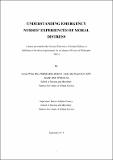| dc.contributor.advisor | Cooney, Adeline | |
| dc.contributor.author | White, Gerard | |
| dc.date.accessioned | 2016-01-28T09:27:48Z | |
| dc.date.issued | 2016-09-29 | |
| dc.identifier.uri | http://hdl.handle.net/10379/5501 | |
| dc.description.abstract | This study sought to understand emergency nurses' experiences of moral distress. Classical Grounded Theory based on the works of Glaser & Strauss and Glaser informed the study design. Participants included Staff Nurses, Clinical Nurse Managers and Advanced Nurse Practitioners who were working in three Emergency Departments (EDs) in the Republic of Ireland at the time of the study. Unstructured conversational interviews were conducted with 36 nurses across the three sites. Twelve semi-structured observations lasting an average of 45 minutes were conducted to provide additional context for the interview findings. The substantive theory of Adaptive Competence emerged from the findings to explain how emergency nurses cope with their main concern of balancing the competing demands of overcrowding and maintaining patient flow to maintain standards of care. The study findings showed that emergency nurses engage in a sliding scale of practice ranging from temporary solutioning to compromising caring to rationing care in response to the competing demands placed upon them by heavy workloads and poor work environments. Temporary solutioning involved nurses going up a gear and stretching capabilities which helped reaffirm their moral integrity and resulted in moral resilience and a sense of role fulfilment. When nurses were unable to find temporary solutions or their efforts were constrained by institutional factors, they engaged in compromising caring which involves stepping back care and reduced surveillance of patients. Nurses used covering as an attempt to maintain minimal levels of surveillance. When nurses face overwhelming workloads due to overcrowding they used rationing care to prioritise the sickest patients. This resulted in reduced dignity and privacy for patients and nurses having to front for the system and apologise for the poor standards of care delivered. Compromising caring and rationing care are the most important causes of moral distress in this study and reflect the failure of participants to deliver basic levels of care in line with established professional standards. This perceived failure by nurses of their professional role damaged moral integrity and in some cases caused burnout among participants. | en_IE |
| dc.rights | Attribution-NonCommercial-NoDerivs 3.0 Ireland | |
| dc.rights.uri | https://creativecommons.org/licenses/by-nc-nd/3.0/ie/ | |
| dc.subject | Nursing | en_IE |
| dc.subject | Moral distress | en_IE |
| dc.subject | Grounded theory | en_IE |
| dc.subject | Emergency | en_IE |
| dc.subject | Nursing and Midwifery | en_IE |
| dc.title | Understanding Emergency Nurses' experiences of moral distress | en_IE |
| dc.type | Thesis | en_IE |
| dc.contributor.funder | College of Medicine and Health PhD Fellowship | en_IE |
| dc.local.note | This study sought to understand emergency nurses' experiences of moral distress. Participants included Staff Nurses, Clinical Nurse Managers and Advanced Nurse Practitioners who were working in three Emergency Departments (EDs) in the Republic of Ireland at the time of the study. Interviews and observations were conducted across the three sites. | en_IE |
| dc.description.embargo | 2017-01-29 | |
| dc.local.final | Yes | en_IE |
| nui.item.downloads | 3090 | |


